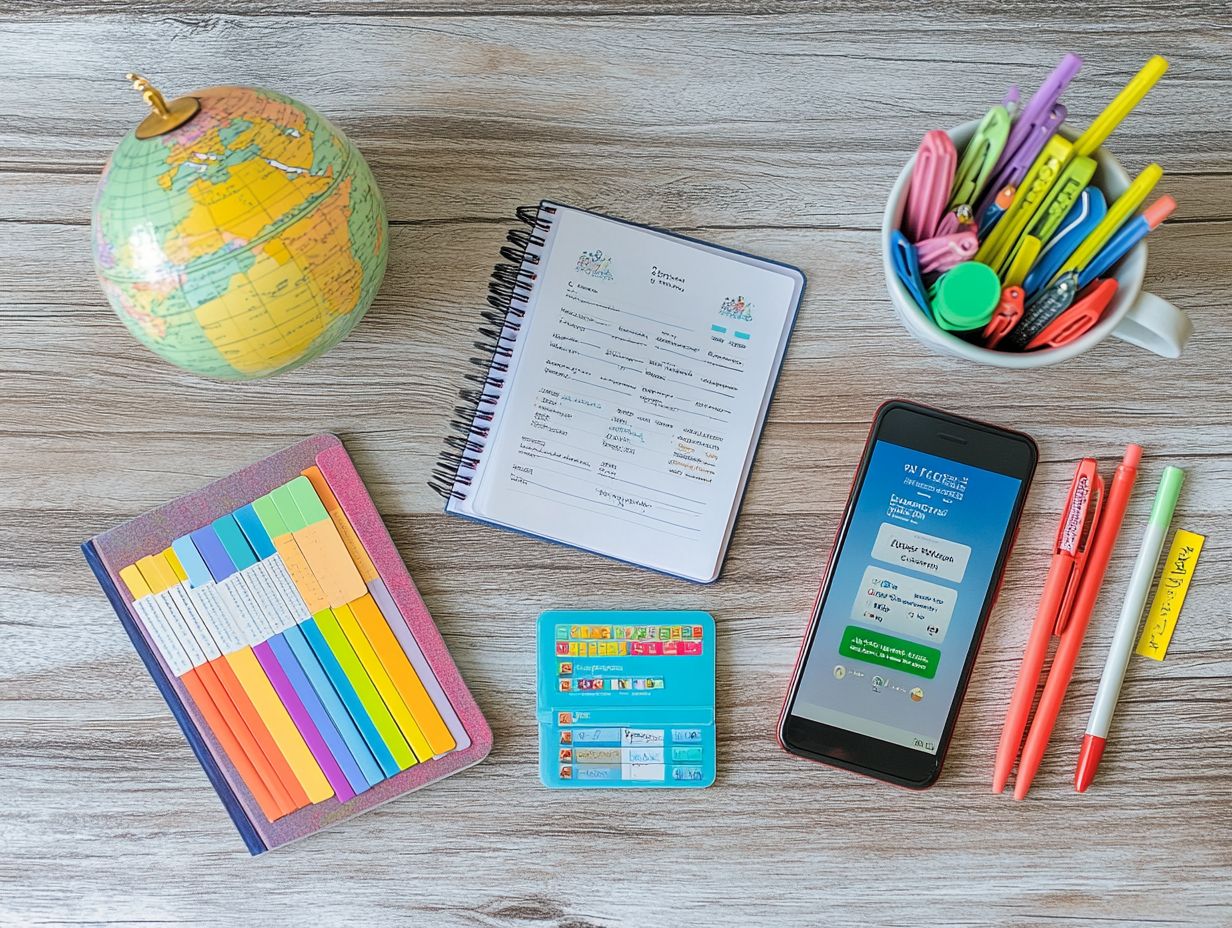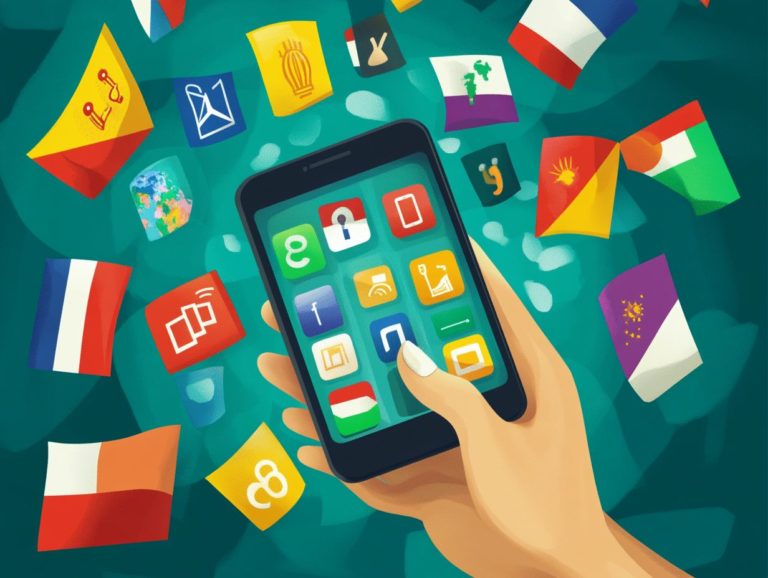must-have language learning tools for beginners
Embarking on a language learning journey can be an exhilarating yet intimidating experience, especially for beginners like you.
Fortunately, a wealth of tools and resources is at your fingertips to make this process smoother and more enjoyable. From innovative language learning apps to captivating podcasts and interactive games, these resources cater to a variety of learning styles and preferences.
This article delves into essential language learning tools designed to help you build a strong foundation, enhance your skills, and confidently achieve your language goals. Whether you lean toward self-study or prefer a more interactive approach, there s something here tailored just for you.
Get ready to discover the best resources to kickstart your language journey!
Contents
- Key Takeaways:
- 1. Language Learning Apps
- 2. Flashcard Apps
- 3. Online Language Courses
- 4. Language Exchange Platforms
- 5. Language Learning Podcasts
- 6. Language Learning Blogs and Websites
- 7. Language Learning Communities
- 8. Language Learning Books and Textbooks
- 9. Language Learning Videos and Tutorials
- 10. Language Learning Games
- 11. Virtual Language Immersion Programs
- 12. Language Learning Software
- 13. Language Learning Forums
- 14. Language Learning Meetup Groups
- 15. Language Learning Social Media Accounts
- What Are the Benefits of Using Language Learning Tools?
- Preguntas Frecuentes
- Cu les son las herramientas imprescindibles para aprender idiomas para principiantes?
- C mo pueden ayudar las aplicaciones de aprendizaje de idiomas a los principiantes?
- Por qu son importantes las aplicaciones de tarjetas de memoria para el aprendizaje de idiomas?
- Cu les son los beneficios de usar podcasts de aprendizaje de idiomas?
- C mo pueden ayudar los sitios web interactivos de aprendizaje de idiomas a los principiantes?
- Los libros de gram tica y los libros de texto siguen desempe ando un papel en el aprendizaje de idiomas para principiantes?
Key Takeaways:

- Language learning tools can include apps, flashcards, online courses, and more.
- These tools can help beginners improve their language skills, connect with others, and stay motivated.
- To choose the right tools, beginners should consider their learning style, goals, and budget.
1. Language Learning Apps
Language learning apps have transformed how you approach mastering new languages. They offer innovative solutions tailored to a variety of learning styles.
With features like brief lessons, interactive quizzes, and comprehensive grammar sections, platforms such as Duolingo, Babbel, and Rosetta Stone are at the forefront of enhancing effective communication.
An ever-growing selection of applications enriches this learning experience by integrating game-like features, making language study both rewarding and enjoyable.
For example, Lingvist employs algorithms to customize lessons based on your progress. Mondly immerses you in augmented reality and utilizes voice recognition for real-time conversation practice.
Pimsleur, in contrast, focuses on auditory learning, allowing you to absorb vocabulary and pronunciation through engaging listening exercises. Such features give you the power to build your vocabulary efficiently, whether you re just starting or further along in your language acquisition journey.
2. Flashcard Apps
Flashcard apps have become your go-to tool for building vocabulary. They offer a dynamic way to engage in spaced recognition practices that enhance both your word comprehension and retention all conveniently packaged in a user-friendly mobile format.
Apps like DuoCards and Memrise utilize sophisticated spaced repetition algorithms. Spaced repetition means showing you words right before you are likely to forget them, helping you remember better.
This intelligent approach dramatically boosts your retention rates. Many of these applications also enhance your learning experience with audio series and visual aids.
For instance, hearing the pronunciation of a word while seeing it in context not only strengthens your memory but also accommodates various learning styles.
3. Online Language Courses
Online language courses provide you with a flexible and structured approach to learning a new language. You can choose from a range of beginner to advanced courses.
Platforms like Fluent and EdX offer you interactive learning experiences that keep you engaged. This flexibility gives you the power to immerse yourself in course material at your own pace.
The variety of multimedia resources at your fingertips enhances the learning experience, featuring everything from videos and podcasts to quizzes and interactive exercises.
The effectiveness of virtual tutoring is transforming traditional education by delivering personalized feedback and support. Structured lessons can be tailored to your individual learning style, ensuring you receive the attention you need to thrive while advancing your language proficiency.
Start exploring these tools today and take the first step toward mastering your new language!
4. Language Exchange Platforms
Language exchange platforms connect you with native speakers, creating a vibrant community for learning. They offer invaluable opportunities for conversation practice and cultural immersion, enhancing your communication skills.
These platforms also offer tools like video chats and chat rooms, facilitating dynamic interactions that are both flexible and engaging. As you immerse yourself in real conversations, you naturally pick up common phrases and useful words elements often elusive in traditional study methods.
You will find that users frequently share cultural insights, enriching your learning experience. Whether you engage in one-on-one exchanges or group sessions, these interactions expedite your language acquisition and build your confidence in using the language in everyday situations.
5. Language Learning Podcasts
Language learning podcasts have emerged as an engaging tool for honing your listening skills, granting you access to a treasure trove of audio series that blend cultural context and useful vocabulary.
These audio experiences offer unparalleled convenience, perfectly suited for your busy lifestyle. Whether you are commuting, exercising, or unwinding at home, you can easily tune in and absorb the language.
By immersing yourself in pronunciation and intonation, you can enhance your listening abilities more effectively than with traditional methods. Podcasts like ‘Coffee Break Languages’ and ‘Pimsleur’s Spanish Pod’ provide rich content that deepens cultural understanding and transforms your learning experience into something truly holistic.
They are an ideal supplement to textbooks and formal classes, creating vibrant avenues to engage with the language beyond the printed page.
6. Language Learning Blogs and Websites
Language learning blogs and websites are your go-to resources, offering insights into effective learning methods and sharing user experiences that showcase practical applications of language skills.
These platforms provide tips to enhance your vocabulary and grammar while including personal anecdotes that make your learning journey relatable and engaging.
For example, sites like FluentU and Babbel Blog present captivating articles that simplify complex grammatical concepts into easy-to-understand segments, while illustrating real-life applications through relatable stories.
Resources like Duolingo s blog inspire you with user success stories and innovative strategies tailored for personalized learning.
By exploring these blogs, you will find many techniques, from flashcard creation to immersive activities, all expertly designed to enrich your language acquisition process.
7. Language Learning Communities

Language learning communities provide a supportive environment where you can engage in community learning, receive valuable feedback, and share your experiences. This collaborative approach enhances your immersion in the language.
Whether these groups form online through forums and social media or in-person during local meetups, they play a crucial role in your language acquisition journey. Here, you can practice speaking in a relaxed setting, allowing conversations to flow naturally and easing any anxiety you might feel.
Members frequently support each other in mastering grammar and vocabulary, fostering a deeper understanding through peer-to-peer learning. This collaborative atmosphere boosts your confidence and cultivates friendships, creating a welcoming environment that encourages your continuous progress in language skills.
8. Language Learning Books and Textbooks
Language learning books and textbooks provide structured lessons that build a solid foundation for your training. They include essential grammar instructions, feedback on pronunciation, and many exercises designed to enhance your skills.
Pairing these traditional resources with modern tools like apps, multimedia resources, or conversation partners amplifies their effectiveness. These materials cater to various proficiency levels, ensuring beginners grasp the basics while advanced learners refine their skills with complex exercises.
Engaging with digital platforms alongside textbooks allows you to embrace different learning styles. For visual learners, videos that complement textbook visuals can be particularly helpful. If you learn better through listening, podcasts and interactive audio exercises can significantly enhance your understanding.
This multifaceted approach reinforces your learning and keeps your educational journey dynamic and stimulating. Start your language journey today!
9. Language Learning Videos and Tutorials
Language learning videos and tutorials use visual aids to present engaging content that improves your listening practice and comprehension skills through interactive lessons.
These resources cater to various learning styles, fostering a deeper connection to the language by incorporating visuals that aid retention. Platforms like Duolingo, Babbel, and YouTube offer a wealth of visual content, from animated explanations to immersive storytelling, allowing you to see the language in action.
Incorporating these visual tools into your broader study plan including reading, speaking exercises, and writing practice cultivates a well-rounded approach that accelerates your language acquisition and keeps you motivated throughout your journey.
10. Language Learning Games
Language learning games make learning fun through games, creating an interactive experience that turns vocabulary building and grammar practice into enjoyable activities. These games come in various forms, from digital platforms to traditional board games, each designed to target specific language skills.
Consider some popular options:
- Vocabulary matching games
- Sentence-building challenges
- Conversational role-plays that immerse you in real-life scenarios
Through these playful methods, you sharpen your understanding of grammar and vocabulary while cultivating vital communication skills. Games like Scrabble, Duolingo, and even multiplayer role-playing adventures show how fun can harmonize with education, making the journey of language acquisition less intimidating and more rewarding.
11. Virtual Language Immersion Programs
Virtual language immersion programs offer a unique opportunity to engage deeply with practical vocabulary and cultural nuances, simulating real-life experiences that enhance language acquisition.
These programs integrate interactive activities and games that reflect real-world scenarios whether navigating a bustling marketplace or attending a vibrant local festival. This hands-on approach lets you practice your language skills in context, making learning more effective.
Platforms like FluentU and Baselang provide comprehensive resources tailored to your proficiency level, ensuring that both beginners and advanced learners benefit from authentic dialogues and rich cultural insights.
By leveraging immersive technologies like virtual reality, these programs transport you into dynamic environments, cultivating not just comprehension but also confidence in your conversational abilities. You’ll find yourself more prepared for real-world interactions, leading to a meaningful learning journey.
Dive into these resources and transform your language learning experience!
12. Language Learning Software
Language learning software offers a holistic approach to mastering a new language. It includes interactive modules, structured lessons, and a wide array of exercises tailored to fit various learning styles.
This rich diversity gives you the power to engage with the material in ways that resonate most with your preferences.
For example, platforms like Duolingo make learning fun by using game-like features, while Rosetta Stone immerses you in contextual experiences that deepen your understanding. Software like Babbel focuses on lessons that improve your conversational skills, enhancing the practical application of your language skills in real-life situations.
With the flexibility these programs provide, you can practice speaking, listening, reading, and writing at your own pace, creating a personalized and effective learning journey that meets your individual needs.
13. Language Learning Forums
Language learning forums provide you with a vibrant platform for community engagement. Here, you can exchange experiences, seek advice, and receive invaluable feedback in a collaborative setting.
These spaces not only cultivate a sense of belonging among learners but also enable the sharing of essential resources like study guides, practice exercises, and practical language tips.
By engaging with others in these forums, you can tap into a wellspring of motivation and accountability. Fellow participants often uplift one another in their language journeys.
Take a moment to explore popular language learning forums, such as Duolingo’s community or Reddit’s language subreddits. These platforms offer diverse perspectives and a treasure trove of knowledge, encouraging you to experiment with new methods and tackle challenges alongside others.
This synergy ultimately enhances your overall language acquisition process, allowing you to thrive in your linguistic endeavors.
14. Language Learning Meetup Groups

Language learning meetup groups are fantastic opportunities! They connect you with native speakers and create a lively community that makes learning fun.
These gatherings break down the walls of traditional classroom settings, inviting you to engage in conversations that reflect real-life situations. By immersing yourself in diverse dialogues, you can enrich your vocabulary, refine your pronunciation, and steadily improve your fluency.
The supportive atmosphere of these groups is a significant confidence booster, allowing you to express yourself freely, unburdened by the fear of making mistakes. This interaction is essential.
It helps you achieve specific learning goals while offering practical applications of the language in everyday conversations, transforming the learning process into something dynamic and genuinely enjoyable.
15. Language Learning Social Media Accounts
Language learning social media accounts have truly become your go-to hub for accessing engaging content that supports community learning and fosters connections among fellow learners.
These platforms elevate the traditional resources you might expect like vocabulary lists and grammar tips by offering interactive experiences such as quizzes, live discussions, and video lessons.
For instance, accounts focused on specific languages often present daily challenges that encourage you to practice in real-time and connect with other learners.
Popular language teachers and polyglots generously share their insights, valuable tips, and useful resources, significantly enhancing your learning journey.
By following these accounts, you can immerse yourself in lively discussions and exchange cultural nuances, creating a vibrant educational environment that goes well beyond the confines of textbook learning.
What Are the Benefits of Using Language Learning Tools?
Language learning tools can greatly enhance your experience. They offer benefits such as improved vocabulary and effective communication.
These tools personalize your learning journey, adapting to different ways people learn. They cater to visual, auditory, and kinesthetic learners.
For example, interactive speaking practice apps can boost your confidence in verbal skills. Flashcard systems use spaced repetition to strengthen your memory.
Video-based platforms provide essential real-world context, helping you understand idiomatic expressions and cultural nuances.
Collaborative tools foster peer interaction. They promote fluency through engaging conversations. By leveraging these diverse resources, you can discover the most effective path to mastering a new language.
This journey transforms your communication abilities and broadens your horizons.
What Are the Different Types of Language Learning Tools Available?
You have a wealth of language learning tools at your fingertips, each designed to meet diverse needs. Options range from mobile apps and software to community-based resources and immersive programs.
Mobile apps often include gamified elements that make learning enjoyable. Software solutions provide structured lessons for various proficiency levels.
Community-based resources, like language exchange groups, create dynamic environments where you can practice speaking and listening in real-time.
Immersive programs whether through travel or local events allow you to interact with native speakers. This enriches your understanding of cultural contexts and practical usage.
The variety of tools available can supercharge your language learning journey!
How Can Beginners Choose the Right Language Learning Tools for Them?
Selecting the right language learning tools for beginners is essential. It fosters effective communication and ensures a seamless learning experience.
Start by assessing how interactive and engaging a tool is. This can greatly influence your motivation to learn.
A user-friendly resource makes initial learning stages enjoyable. It reduces frustration and encourages regular practice.
Having clear learning goals can guide your selection process. Whether aiming for conversational fluency, vocabulary enhancement, or grammar mastery, choose tools that provide targeted support.
Consider how well the tools work on different devices. Ensuring accessibility on your smartphone, tablet, or computer allows you to learn whenever and wherever you like.
What Are Tips to Maximize Language Learning Tools?
To maximize your experience with language learning tools, embrace effective methods, engage in community learning opportunities, and practice vocabulary and conversation skills consistently.
Incorporating a variety of resources enriches your journey. Using language apps alongside traditional textbooks exposes you to diverse contexts for vocabulary.
Regularly participating in language exchange groups cultivates a sense of belonging and allows for invaluable real-time practice.
Set specific, achievable goals to keep you motivated and track your progress. By leveraging these strategies, you can create a robust language learning experience that is both enjoyable and effective.
How Can Language Learning Tools Help You Reach Your Goals?
Language learning tools are invaluable for achieving your specific language goals. They provide targeted resources, practice exercises, and real-world communication opportunities.
For example, mobile apps like Tandem and HelloTalk let you connect with native speakers. This immersion in authentic dialogues significantly boosts your conversational skills.
Platforms like Quizlet are great for building vocabulary. They use engaging flashcards and quizzes to help you remember essential terms and phrases easily.
Grammarly not only spots grammar errors but also offers insights to help you understand complex language rules as you write.
When you customize these tools to fit your personal objectives, you navigate your language learning journey with confidence and ease.
Preguntas Frecuentes

Cu les son las herramientas imprescindibles para aprender idiomas para principiantes?
Las herramientas imprescindibles para aprender idiomas para principiantes incluyen:
- Aplicaciones de aprendizaje de idiomas como Duolingo, Memrise o Babbel.
- Aplicaciones de tarjetas de memoria como Anki o Quizlet.
- Podcasts de aprendizaje de idiomas.
- Sitios web interactivos de aprendizaje de idiomas como Rosetta Stone.
- Libros de gram tica o libros de texto.
- Un compa ero de intercambio de idiomas o grupo de conversaci n.
C mo pueden ayudar las aplicaciones de aprendizaje de idiomas a los principiantes?
Las aplicaciones de aprendizaje de idiomas son una excelente manera para que los principiantes comiencen a aprender un idioma. Estas aplicaciones convierten el aprendizaje en una aventura emocionante con lecciones interactivas que hacen que aprender sea divertido y f cil.
Tambi n ofrecen una variedad de funciones, como reconocimiento de voz, juegos y seguimiento del progreso, para ayudar a los principiantes a mantenerse motivados y ver su avance.
Por qu son importantes las aplicaciones de tarjetas de memoria para el aprendizaje de idiomas?
Las aplicaciones de tarjetas de memoria son herramientas valiosas para el aprendizaje de idiomas. Ayudan a los principiantes a practicar y memorizar nuevo vocabulario y conceptos gramaticales.
Estas aplicaciones a menudo utilizan la repetici n espaciada, un m todo que ayuda a recordar informaci n revis ndola en intervalos programados.
Cu les son los beneficios de usar podcasts de aprendizaje de idiomas?
Los podcasts de aprendizaje de idiomas son una forma excelente para que los principiantes mejoren sus habilidades de escucha y comprensi n. A menudo presentan hablantes nativos y cubren una amplia gama de temas, lo que los convierte en una manera divertida y atractiva de aprender.
Adem s, los podcasts se pueden escuchar mientras te desplazas, lo que los hace convenientes para personas ocupadas.
C mo pueden ayudar los sitios web interactivos de aprendizaje de idiomas a los principiantes?
Los sitios web interactivos de aprendizaje de idiomas, como Rosetta Stone, utilizan diversas herramientas multimedia, como juegos, videos y reconocimiento de voz, para ayudar a los principiantes a aprender un idioma.
Estos sitios suelen ofrecer planes de aprendizaje personalizados que se adaptan al nivel y ritmo del estudiante, lo que los convierte en una gran herramienta para principiantes de todas las edades.
Los libros de gram tica y los libros de texto siguen desempe ando un papel en el aprendizaje de idiomas para principiantes?
S , los libros de gram tica y los libros de texto siguen siendo importantes para los principiantes que aprenden un nuevo idioma. Proporcionan un enfoque estructurado y completo para aprender las reglas gramaticales y pueden utilizarse como referencia para ejercicios pr cticos.
Muchos cursos de aprendizaje de idiomas tambi n utilizan libros de texto como complemento a sus lecciones.






